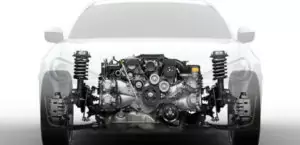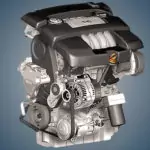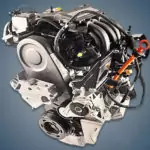The 1.4-liter Volkswagen CDGA 1.4 TSI EcoFuel turbo engine was produced from 2009 to 2015 and was installed on methane modifications of such popular models as the Passat and Touran. This unit has been designed to operate on CNG compressed natural gas.
The EA111-TSI series includes: CBZA, CBZB, BMY, BWK, CAVA, CAVD, CAXA, CDGA, CTHA.
Specifications
| Production years | 2009-2015 |
| Displacement, cc | 1390 |
| Fuel system | direct injection |
| Power output, hp | 150 |
| Torque output, Nm | 220 |
| Cylinder block | cast iron R4 |
| Block head | aluminum 16v |
| Cylinder bore, mm | 76.5 |
| Piston stroke, mm | 75.6 |
| Compression ratio | 10.0 |
| Features | DOHC |
| Hydraulic lifters | yes |
| Timing drive | chain |
| Phase regulator | on the intake shaft |
| Turbocharging | KKK K03 & Eaton TVS |
| Recommended engine oil | 5W-30 |
| Engine oil capacity, liter | 3.6 |
| Fuel type | petrol |
| Euro standards | EURO 5 |
| Fuel consumption, L/100 km (for VW Passat 2009) — city — highway — combined |
8.8 5.6 6.8 |
| Engine lifespan, km | ~260 000 |
| Weight, kg | 130 |
The engine was installed on:
- Volkswagen Passat B6 (3C) in 2009 – 2010; Passat B7 (36) in 2010 – 2014;
- Volkswagen Touran 1 (1T) in 2009 – 2015.
Disadvantages of the VW CDGA engine
- This engine is designed to run on gas and is afraid of low-quality fuel.
- Pistons are often destroyed by detonation and many simply change them to forged ones.
- Even from low-quality fuel, intake valves are covered with soot and compression drops.
- A significant part of calls to the service station is associated with the replacement of an unreliable timing chain.
- In the turbine, the electronic control valve most often fails, as well as the wastegate.
- On specialized forums, they constantly complain about engine vibrations at cold temperatures and antifreeze leaks.






